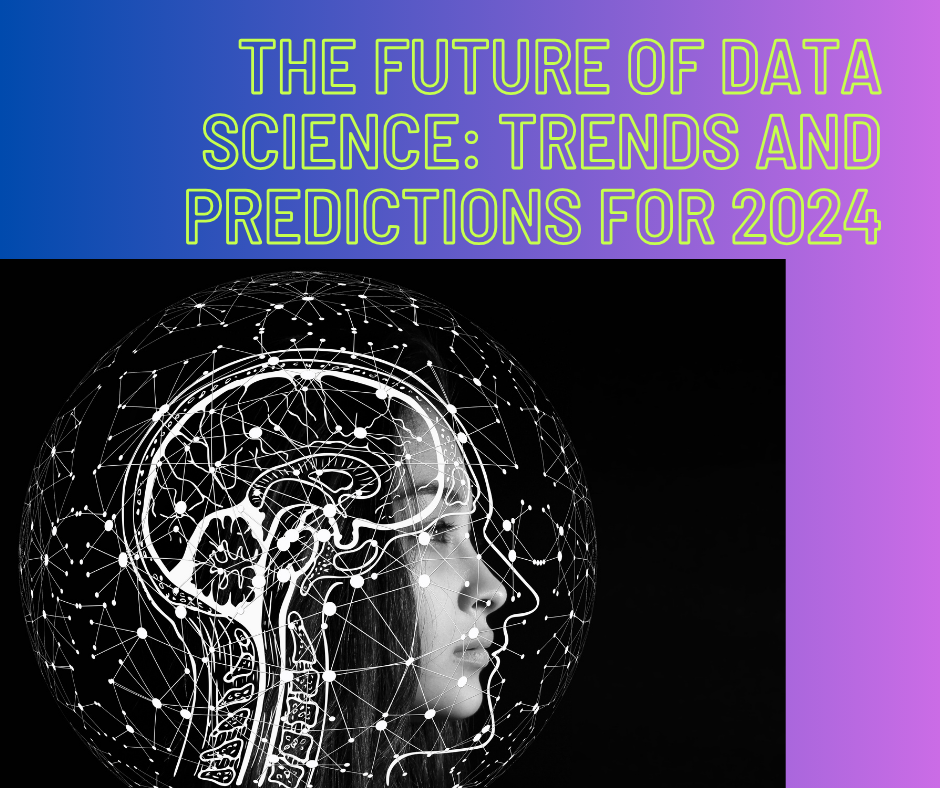Introduction:
In the ever-evolving realm of technology, data science emerges as a cornerstone, reshaping industries, and driving innovation. As we venture into 2024, the landscape of data science is characterized by dynamic trends and insightful predictions, underlining the significance of specialized education such as the Data Science Course. This article explores the transformative trends shaping the future of data science and the importance of continuous learning in this rapidly evolving field.
1.Advanced AI and Machine Learning Integration:
The convergence of advanced artificial intelligence (AI) and machine learning (ML) algorithms will continue to redefine data science practices in 2024 and beyond. Organizations across various sectors will leverage AI-driven insights to enhance decision-making processes, optimize operations, and drive business growth. From predictive analytics in finance to personalized healthcare solutions, the integration of AI and ML will unlock new possibilities for innovation and efficiency.
2.Edge Computing and IoT Expansion:
The proliferation of Internet of Things (IoT) devices will drive the adoption of edge computing frameworks within data science workflows. In 2024, organizations will increasingly rely on edge analytics to process and analyze real-time data at the source, minimizing latency and improving scalability. Industries such as manufacturing, logistics, and healthcare will harness the power of edge computing to drive operational efficiency, predictive maintenance, and proactive decision-making.
3.Ethical AI and Responsible Data Science:
Ethical considerations and responsible data practices will take center stage in 2024 as organizations grapple with the implications of AI-driven technologies. With the growing concerns surrounding data privacy, bias, and algorithmic accountability, the need for ethical AI frameworks and transparent decision-making processes becomes paramount. Data science professionals will be tasked with ensuring that AI applications adhere to ethical guidelines and mitigate potential risks, fostering trust and integrity in the use of data-driven technologies.
4.Augmented Analytics and Natural Language Processing:
Augmented analytics, powered by natural language processing (NLP) and automation, will democratize data access and decision-making processes in 2024. By integrating AI-driven capabilities into analytics platforms, organizations can empower users at all levels to derive actionable insights from complex datasets. From automated insights generation to conversational analytics interfaces, augmented analytics will enhance productivity and drive innovation across industries.
5.Cybersecurity and Data Privacy Imperatives:
As cybersecurity threats continue to evolve, data science will play a critical role in fortifying defenses and safeguarding sensitive information. In 2024, organizations will adopt advanced techniques such as differential privacy, federated learning, and homomorphic encryption to protect data privacy while mitigating the risk of data breaches. Compliance with stringent data privacy regulations such as GDPR and CCPA will be paramount, driving the adoption of privacy-preserving data science techniques and robust cybersecurity measures.
6.Upskilling and Continuous Learning:
Continuous upskilling will be essential for data science professionals to thrive in the competitive landscape of 2024. Specialized education programs such as the Data Science Training will equip learners with the skills and expertise needed to excel in this rapidly evolving field. From hands-on experience with cutting-edge tools and technologies to practical insights into real-world applications, these courses will empower individuals to stay ahead of the curve and drive innovation in their respective domains.
7.Blockchain Integration and Decentralized Data Analytics:
In 2024, the integration of blockchain technology into data science workflows will gain traction, enabling decentralized data analytics and enhancing data security and transparency. Blockchain’s immutable ledger and decentralized architecture will revolutionize data management, enabling secure and tamper-proof transactions and facilitating trusted data sharing among multiple parties. Industries such as supply chain management, finance, and healthcare will leverage blockchain-based data science solutions to streamline processes, reduce fraud, and enhance trust in data-driven transactions.
8.Quantum Computing and Advanced Data Processing:
Quantum computing will emerge as a game-changer in data science, enabling unprecedented computational power and accelerating data processing capabilities. In 2024, advancements in quantum algorithms and hardware will pave the way for breakthroughs in data analysis, optimization, and cryptography. Organizations will explore quantum-inspired algorithms and quantum machine learning techniques to tackle complex optimization problems, simulate molecular structures, and enhance cybersecurity defenses. While mainstream adoption of quantum computing may still be in its infancy, the potential impact on data science and computational research is profound and far-reaching.
9.Interdisciplinary Collaboration and Domain Expertise:
In 2024, interdisciplinary collaboration and domain expertise will be instrumental in driving innovation and addressing complex societal challenges through data science. Collaborative efforts between data scientists, domain experts, and stakeholders from diverse fields such as healthcare, environmental science, and social sciences will foster holistic approaches to data analysis and decision-making. By combining domain-specific knowledge with data science techniques, interdisciplinary teams can uncover insights, develop actionable solutions, and drive positive societal impact. Data science education programs will emphasize the importance of interdisciplinary collaboration and equip learners with the skills to effectively communicate and collaborate across domains.
10.Explainable AI and Interpretability:
In 2024, the demand for explainable AI (XAI) and model interpretability will rise significantly as organizations seek to understand and trust the decisions made by AI systems. With the increasing adoption of complex AI models, such as deep learning neural networks, there is a growing need to explain the rationale behind their predictions and recommendations. XAI techniques will enable data scientists to provide transparent and interpretable insights, allowing stakeholders to validate model behavior, identify biases, and make informed decisions. By prioritizing model interpretability, organizations can enhance trust in AI systems and foster greater acceptance and adoption across various sectors.
11.Continuous Evolution of Data Ethics and Regulatory Compliance:
In 2024, data ethics and regulatory compliance will continue to evolve in response to emerging technologies and societal concerns. As data science becomes increasingly pervasive, organizations will face greater scrutiny and accountability regarding data collection, processing, and usage. Regulatory frameworks, such as the General Data Protection Regulation (GDPR) and the California Consumer Privacy Act (CCPA), will evolve to address new challenges posed by advancements in AI, big data, and digital surveillance. Data science professionals will need to stay abreast of evolving regulations and ethical guidelines, ensuring compliance and upholding ethical standards in their data-driven endeavors. Specialized education programs, such as the Data Science Training Institute in Delhi , Noida ,Mumbai ,Bangalore and other parts of India .will incorporate modules on data ethics and regulatory compliance to equip learners with the knowledge and skills needed to navigate the complex landscape of data governance and privacy.
Conclusion:
As we navigate the future of data science in 2024, it is clear that the convergence of advanced technologies, ethical considerations, and continuous learning will shape the trajectory of this dynamic field. By embracing emerging trends and fostering a culture of innovation and lifelong learning, organizations and professionals can harness the full potential of data-driven insights to drive sustainable growth and create positive societal impact. In this journey, specialized education programs such as the Data Science Course will serve as catalysts for success, equipping learners with the skills and knowledge needed to thrive in the digital age.




